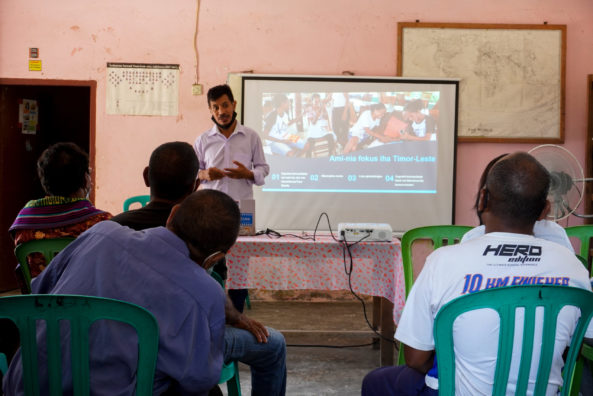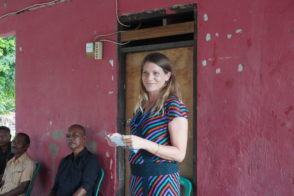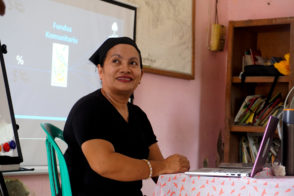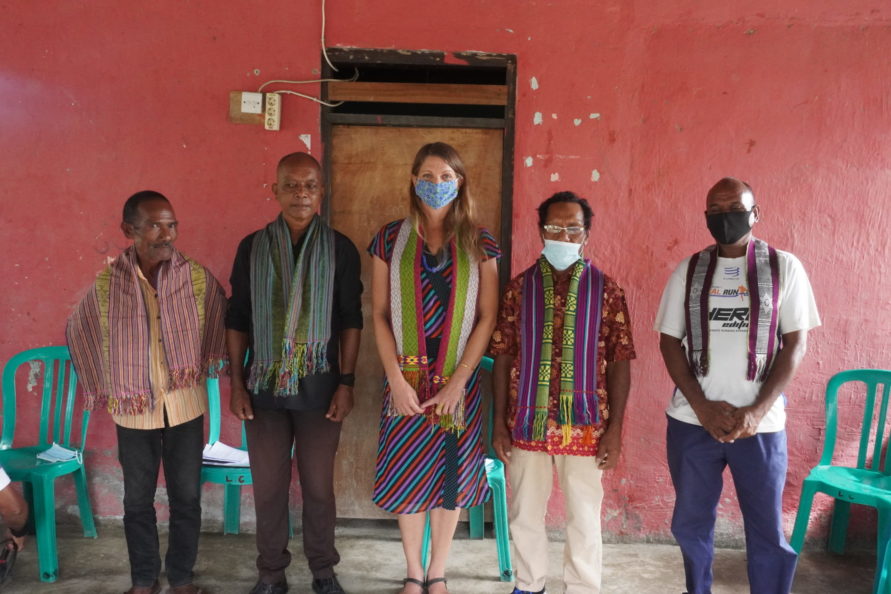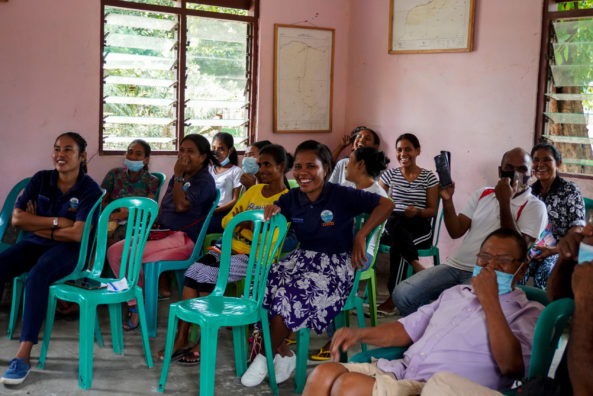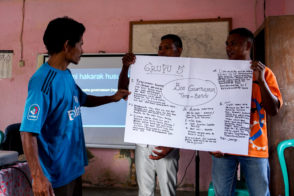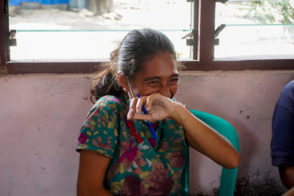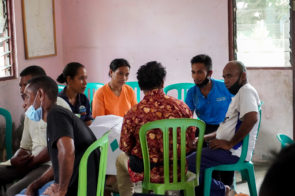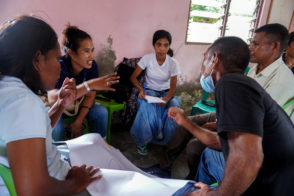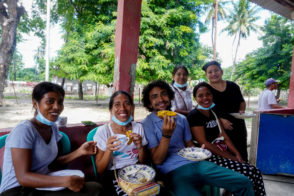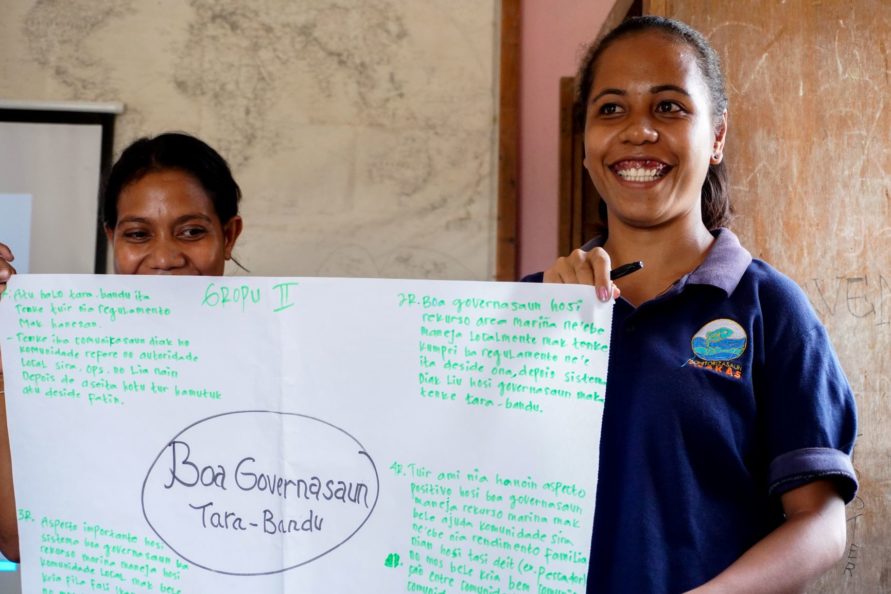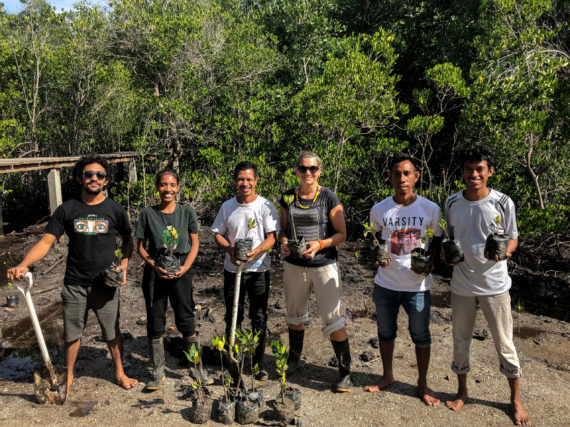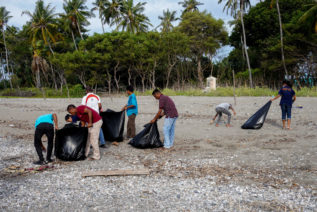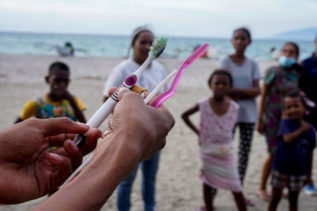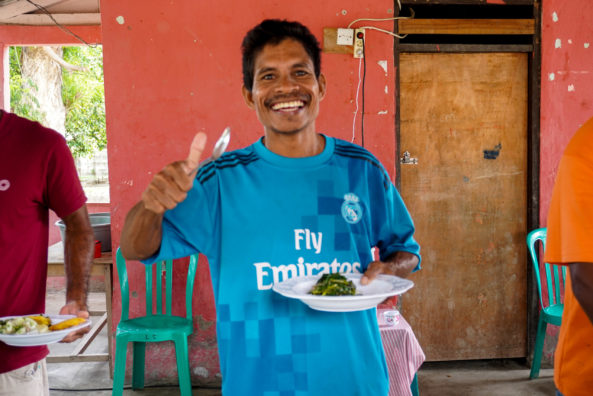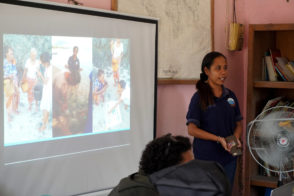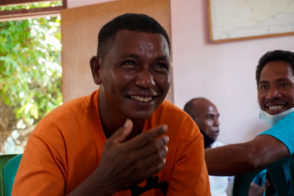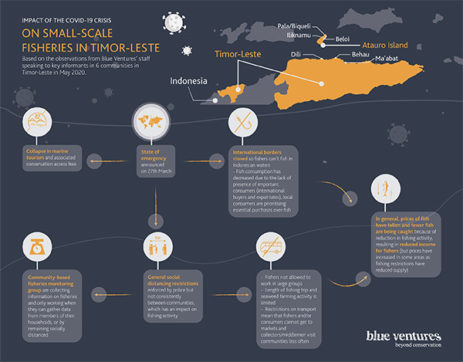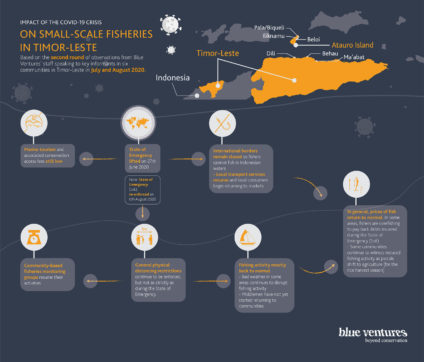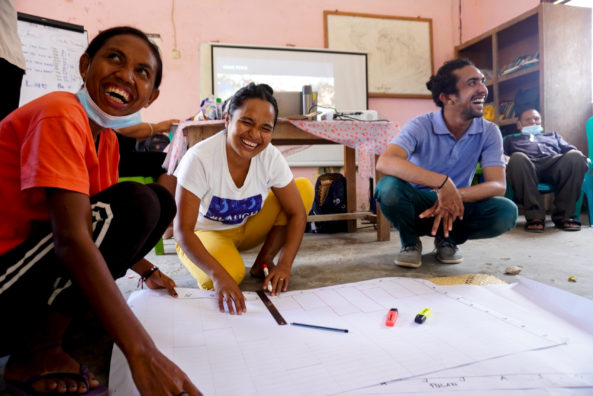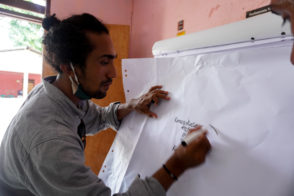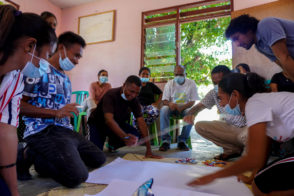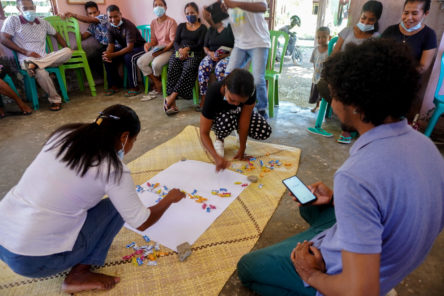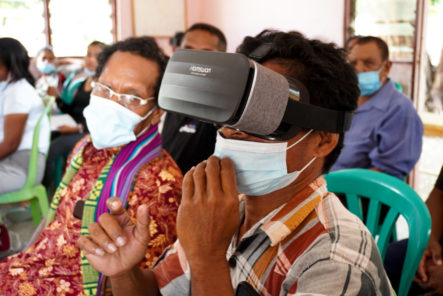Despite the prevailing wet season, it is an unusually clear and warm February day, and the sun shines bright on the community of Beto-Tasi on mainland Timor-Leste, where something momentous is about to commence. Thirty representatives from nine different communities that Blue Ventures works with gathered in the sede aldeia, a communal meeting place. Some have made the journey across the Wetar Strait from the island of Atauro, while others have travelled from further away in the mainland. They spent the previous night in the homestays in Beto-Tasi, which were established in October last year. Over the course of three days, they will be participating in a learning exchange focused on locally managed marine areas (LMMAs) in Timor-Leste. This is the biggest exchange we have organised and facilitated in the history of Blue Ventures’ presence in the country, and it promises to be an engaging and thought-provoking affair.
Since the exchange will be focused on LMMAs, LMMA coordinators (who monitor various aspects of these community-managed protected areas, including collecting access fees, maintaining surface marker buoys, and reporting back to the community) from different communities make up a majority of the group. There are also community-based fisheries monitoring (CFM) and seagrass monitoring (CSM) group members, as well as members from homestay families in Atauro (representing the Atauro Homestay Association). Alito Rosa, the Director of Konservasaun Flora no Fauna (KFF), the country’s first local conservation organisation, is also present.
In keeping with our organisational ethos of ‘communities first’, this session is entirely driven by the needs and wants of community members.The event kicks off with introductory speeches by the Xefi Suku (village chief) and by representatives from Blue Ventures, as well as a small welcome ceremony. The first day is devoted to discussions on the idea of establishing a community fund. In Timor-Leste, a small payment is required to access LMMAs, for example, if someone wanted to go diving. This payment, along with a portion of the income from other ecotourism activities (such as homestays), could be set aside as a fund for the benefit of the entire community, and perhaps be put towards marine conservation efforts, like surveillance of an LMMA. This is of immense interest to the participants; after breaking into smaller groups, they enthusiastically discuss this idea. In keeping with our organisational ethos of ‘communities first’, this session is entirely driven by the needs and wants of community members.
There is also a discussion on the concept of electing one representative from each community we work with – whether it is actually needed, what it would look like, and if it would lay the foundation for the eventual creation of a ‘network’ of coastal Timorese communities in future, sharing resources and learning from each other. Armindo, our community liaison officer, collects everyone’s responses, which we will review to determine next steps.
In an effort to create awareness about the different coastal and marine ecosystems an LMMA may include, Alito presents an overview of mangrove ecosystems and their importance in the context of marine management in Timor-Leste. KFF runs the Sentru Estudu Mangrove (Mangrove Study Centre) in Hera, which the Blue Ventures team visited last December to explore the possibility of jointly trialling mangrove conservation activities in the country.
The previous year has been a difficult one due to the pandemic. For me personally, it has meant moving back from Timor-Leste to my hometown of Nagpur, India, working remotely to plan and organise this exchange in Beto-Tasi, and supporting the team in Timor-Leste in facilitating it.
In March 2020, the Government of Timor-Leste announced a State of Emergency – the ripple effects of this included a collapse in marine tourism, a decrease in fish consumption due to the prioritisation of essential purchases over fish, and restrictions on the length of fishing trips as well as on large gatherings of people.In March 2020, the Government of Timor-Leste announced a State of Emergency – the ripple effects of this included a collapse in marine tourism, a decrease in fish consumption due to the prioritisation of essential purchases over fish, and restrictions on the length of fishing trips as well as on large gatherings of people. For the small-scale fisheries sector, this meant that the price of fish dropped in the early months of 2020. Although prices eventually returned to normal after a couple of months, the effects of the pandemic on food security have been strongly felt, with the community in Behau Fatumeta choosing to reopen their Tara Bandu LMMA in mid-September 2020 temporarily (for a period of six months) for day-time fishing, ahead of the originally planned date. Aquelino da Cunha, the LMMA coordinator from the community of Behau Fatumeta, talks about this decision to the rest of the attendees at the exchange, describing the community’s concern during this period.
This concern is echoed during a presentation by the CFM group on monitoring methodologies, talking about how data collection efforts have been disrupted by the pandemic. A presentation on seagrass monitoring by the CSM group is in a similar vein. In early 2021, the community in Behau Fatumeta had also anecdotally mentioned an increase in LMMA infractions during the pandemic – this is used as a basis to organise focus group discussions with the attendees to think about what constitutes ‘good governance’. Structured conversations around good governance and compliance are key to the success of an LMMA – these sessions offered a golden opportunity to engage the various communities we work with in these conversations.
The LMMA coordinators have different perspectives on governance and what steps can be taken to strengthen surveillance efforts moving forward, and Cristina, our administration and operations officer, takes detailed notes during this lively discussion, to allow us to better inform our consultations in future. Abrão, our conservation officer, then provides an overview of the impact of COVID-19 on small-scale fisheries in Timor-Leste, based on questionnaires administered by our team throughout 2020.
Although we have been working with coastal communities to monitor marine ecosystems and collect data, especially through participatory monitoring, it is imperative that communities are able to make sense of this data to inform management measures. With this in mind, the final day of the mega learning exchange is devoted to a day-long data literacy training session, led by Dedy, our conservation coordinator, with the aid of graphs on data collected by CFM group members, and an engaging game on fisheries management measures. The day ends with the screening of various marine-themed documentaries (including ‘Timor-Leste from Below’ and ‘A Plastic Ocean’) for not only the attendees but also the wider community of Beto-Tasi.
As the representatives head back to their respective homestays to stay the night and prepare for their journey home, there is a heightened sense of camaraderie in the air. People who did not know each other before are speaking with an easy familiarity, discussing thoughts and ideas on better managing their marine environments through LMMAs, exploring the potential for further learning opportunities, and charting out a new post-pandemic pathway towards sustainable community-led marine management in Timor-Leste.
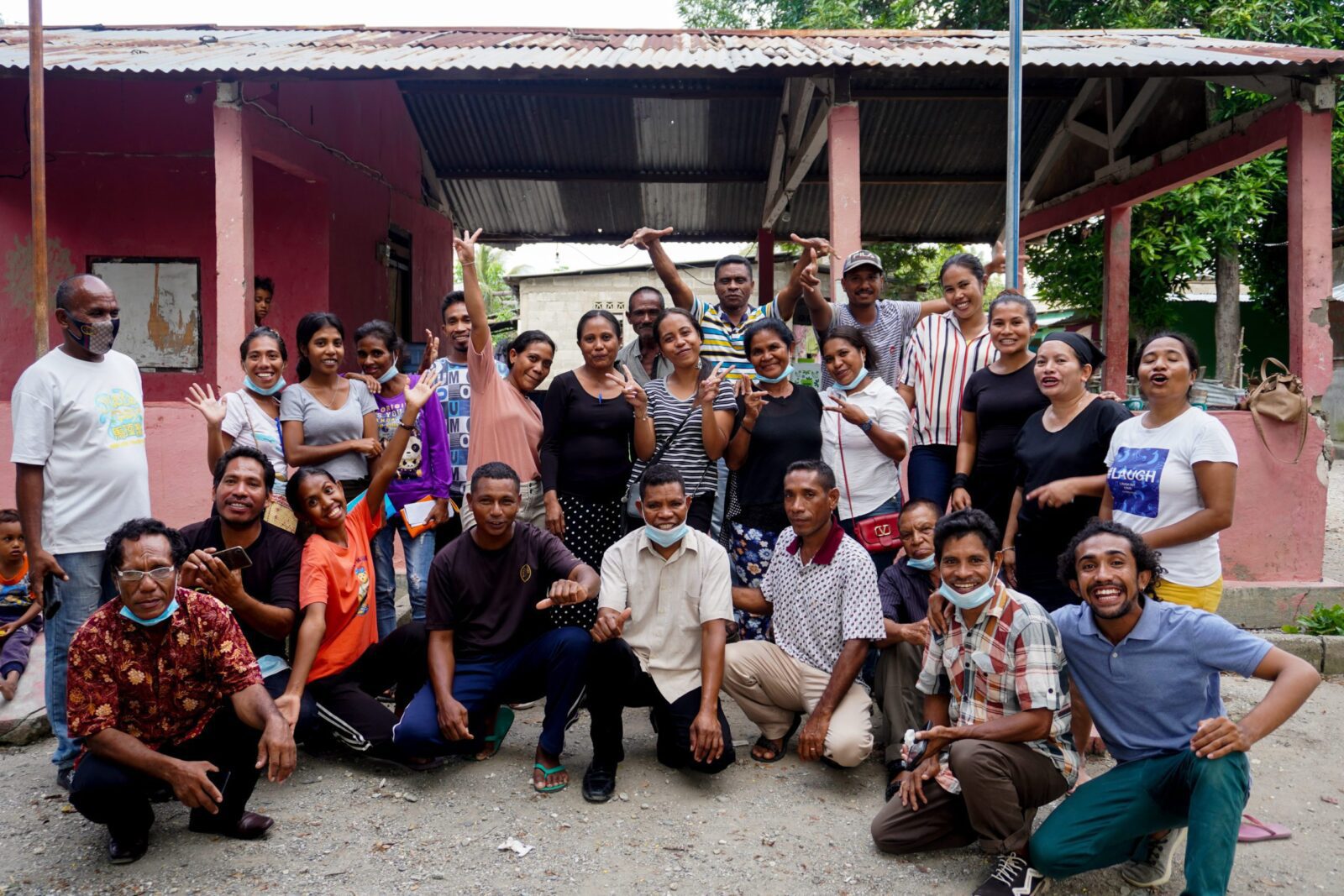
A group photo of the attendees | Photo: Abrão Soares Pereira
Read about how team Timor-Leste united to take on the impacts of the pandemic
Learn more about how communities are taking control with Tara Bandu in Behau
Thank you to all of the community members who took part in this exchange, and who shared their experiences with us. Thank you to our colleagues; Dedy Martins and Abrao Soares Pereira for photographing the event.





